#dating site christian
Text
Nightbringer is so funny bc if diavolo didn’t threaten to send us back to the human world(idk of that happens I’ve only heard) Lilith would still he here no? I don’t think she would be like a baby when they said she was reborn as a human I just assume they just put her in the world and erased her memories but she was probably reborn as a child and grew up. But she would still be around meaning that it would be so incredibly far into the past because even they had a hard time tracing MC’s lineage😭 so imagine going back to like a time before lightbulbs were invented. Absolutely the FUCK NOT!!! I could not for a second live as a small sickly Victorian child no way I would be able to survive watching people Live in their own filth😭🤢 I’m sorry i’m not witnessing slavery or the black plague Dia has me all the way fucked up I’m too spoiled by modern technology like socks and hoodies
#obey me#obey me shall we date#obey me x black reader#obey me nightbringer#nightbringer lucifer#nightbringer spoilers#om! nightbringer#nightbringer mc#nightbringer diavolo#Barbados you better take my ass home now!!#I think I would actually change the course of history#if you put me in there and I’m watching slavery happen in like real time#I am going to overthrow the Catholic Church and change Christianity and Catholicschism as we know it#i’m going to start killing priests#I’m so serious telling people to shoot Christopher Columbus on site don’t even let them step foot on America#get gone!!!#like they didn’t take baths I know they smell bad🤢#they have a bouquet of flowers at weddings because those used to be onions#to disguise the smell of how bad people smelled because weddings used to take place in the summer#and these people haven’t discovered soap yet so onions#I would literally be throwing up so quickly#And if we have a canon Lilith design I need that white women to protect me#ain’t no way
122 notes
·
View notes
Text
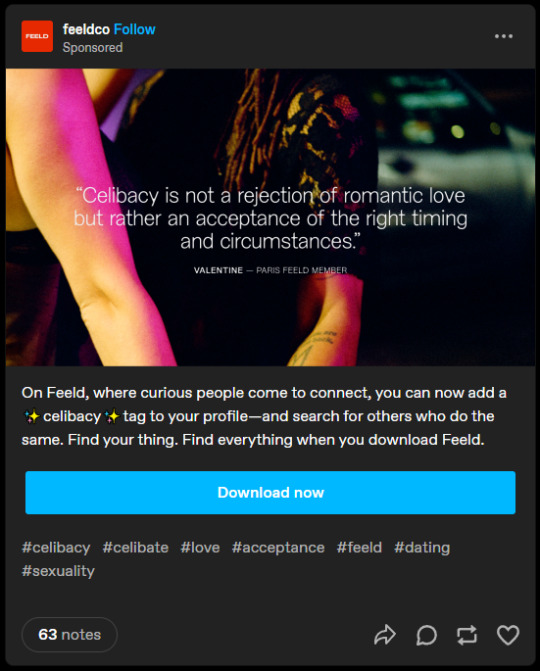
You people need to stop making jokes about this being the celibacy website now I'm getting fucking ads for it 😭
#Not Pets#At first I thought this was some sort of Christian dogshit#and then I thought it was a joke from the staff#but I think it's some kind of dating site????#Inb4 ''um why are you not using adblock'' I have it turned off on Tumblr because some of these ads are insanely funny and bizarre
2 notes
·
View notes
Text
White Men Looking for Love in Uganda Whatsapp Number

Greetings, Admin, I'm Mercy from Gulu, and the other day you introduced me to White Sugar Daddy Michael from the States. There aren't enough words to explain what you did to me. Admin, you are my idol. I could not be leading the life that I am leading without. We need to come to your office so we may deliver a gift. Simply to express gratitude.
Michael possesses gentleness. He is romantic, industrious, and endowed with a good heart. The man of my fantasies, exactly. Thank you, admin, and enjoy yourself. Keep up the fantastic work. I'll recommend you to all of my friends. I know of no other authentic website in Kenya but yours.
For instant and legit hookup services with sponsors, TEXT Admin on Telegram: https://t.me/SweetAdmin254
#Rich White Men in Africa#Christian white men in Uganda Dating site#white men whatsapp number#Black and White Dating WhatsApp Group Link#Sugar Mummy on Whatsapp#Phone Numbers and Contacts
0 notes
Text
youtube
Christian Polygamy, Text 573-891-1933
#polygamy#christian polygamy#polyamory#polyamorous#polyamourous#dating#dating site#dating online#relationship#single male#single female#lovers#love#love quotes#i love him#i love you#god first#christianity#polygamy dating site#Youtube
0 notes
Text
just got done watching cecil b demented (2000), it was a very fun watch! loved the action, makeup/costume designs, etc!!
0 notes
Text
Online Dating For Professionals | Black Christian Dating Sites
Pursue Dating is Black Christian Dating Sites for christian singles! We also provide Online Dating For Professionals singles. Visit us to register for free now! https://pursuedating.com/contact
0 notes
Text
Online Dating Girls
If you see anything you like here. Stop and say Hi, it's not rocket science. Pack a Bag and bring a smile. Singles women looking for a very affectionate

Free Christian dating sites that offer unlimited matching and messaging ... dating service for meeting Christian Filipino women and men.
https://www.hothover.com/
1 note
·
View note
Text
Feminism has always, always had a history with Racism and White Supremacy - particularly in a way that promotes fascist leaning "Protection for Me and Mine" type "activism".
There have always been several Upper Class, White, Women at the helm of Feminist movements and it is something Poor, Working Class, Women of Color have been vocally criticizing since the First Wave.
I mean, US Americans, did you not learn about Sojourner Truth? Have you not read "Ain't I A Woman?"? It is one of the most famous early accounts of the racialized nature of gender. It perfectly highlights the way the social aspects of gender have always been barred from People of Color in a way they aren't barred from White People in a firsthand historical account.
Women's Suffrage, and subsequently the First Wave of Feminism was an actively Racially Segregated movement. White Suffragettes intentionally campaigned for themselves and themselves only because they thought that campaigning for Black, Immigrant, and Indigenous Women would undermine their own movement. They did not seek liberation for women, they sought the Systemic, Institutional Power of their White Male Peers and they got it - by intentionally leaving Women of Color behind them.
This is most evident in the fact that White Women received the right to vote in 1920, but Black Women did not receive the right to vote until 1965 with the Voting Rights Act. Almost 50 years later. That is over half a lifetime. This was also only approximately 2-3 years before Radical Feminism and the Second Wave began around 1967~1968.
If you think racial segregation and racism in the Feminist Movement ended with Black Women's suffrage and completely dissipated within the two years it took for the Second Wave to pick up it's feet, you are naïve at best and actively racist yourself at worst. The Women's Liberation Movement / Radical Feminism have always been White Woman's movements riding the coattails of the Suffragette's racism.
Look at the website for the Women's Liberation Front. WoLF is one of the original Radical Feminist organizations. It was founded in the late 60's and is one of the largest Radfem organizations to date. Now. Look at their board. Look at the photos of women they choose to include across their site. Look at the women who are speaking at their events. Beyond one or two token Black Women, it is a sea of Whiteness.
You know who is a special advisor to WoLF and the founder of the group "Standing for Women"? Kellie-Jay Keen-Minshull, aka Posie Parker. Kellie-Jay is the woman who popularized "Woman means adult human female" as an anti-trans slogan. Kellie-Jay is also real good buddies with - you guessed it! Neo-Nazis and White Supremacists!
WoLF also takes money from the Alliance Defending Freedom, (ADF) a Right Wing Christian Organization, and it's members have worked directly with the Heritage Foundation, a Conservative organization founded during the Reagan Presidency.
Radical Feminism as a political movement cares about the lives and held power of White Women under the guise of "Women's Liberation" in the exact same way as their foremothers, the Suffragettes. It's a foundationally White Supremacist movement. Black Feminists, Indigenous Feminists, Immigrant Feminists, and Colonized Feminists have been talking about this for over a century but it falls on White ears so why would they listen.
#original post#long post /#anti radfem#anti radical feminism#anti terf#feminism#feminist#anti racism
1K notes
·
View notes
Text
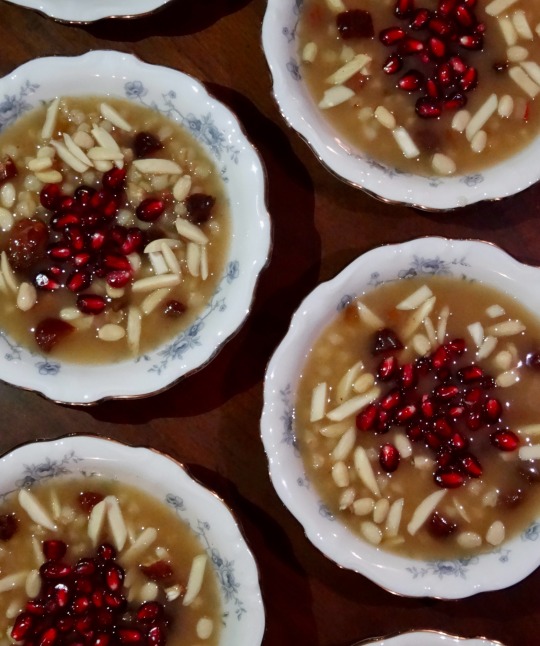
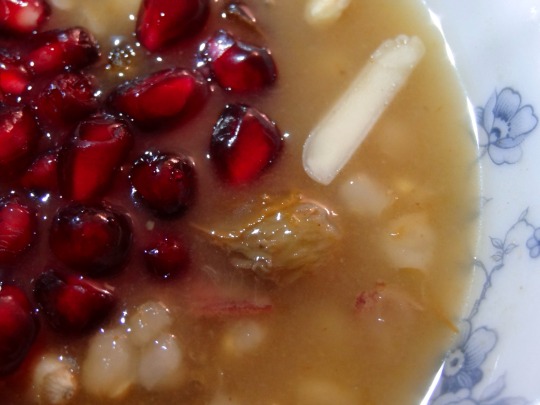
[ID: First image shows four small porcelain bowls of a pudding topped with slivered almonds and pomegranates seeds, seen from above. Second image is an extreme close-up showing the blue floral pattern on the china, slivered almonds, golden raisins, and pomegranate seeds on top of part of the pudding. End ID]
անուշապուր / Anush apur (Armenian wheat dessert)
Anush apur is a sweet boiled wheat pudding, enriched with nuts and dried fruits, that is eaten by Armenians to celebrate special occasions. One legend associates the dish with Noah's Ark: standing on Mt. Ararat (Արարատ լեռը) and seeing the rainbow of God's covenant with humanity, Noah wished to celebrate, and called for a stew to be prepared; because the Ark's stores were diminishing, the stew had to be made with small amounts of many different ingredients.
The consumption of boiled grains is of ancient origin throughout the Levant and elsewhere in West Asia, and so variations of this dish are widespread. The Armenian term is from "անուշ" ("anush") "sweet" + "ապուր" ("apur") "soup," but closely related dishes (or, arguably, versions of the same dish) have many different, overlapping names.
In Arabic, an enriched wheat pudding may be known as "سْنَينِيّة" ("snaynīyya"), presumably from "سِنّ" "sinn" "tooth" and related to the tradition of serving it on the occasion of an infant's teething; "قَمْح مَسْلُوق" ("qamḥ masluq"), "boiled wheat"; or "سَلِيقَة" ("salīqa") or "سَلِيقَة القَمْح" ("salīqa al-qamḥ"), "stew" or "wheat stew," from "سَلَقَ" "salaqa" "to boil." Though these dishes are often related to celebrations and happy occasions, in some places they retain an ancient association with death and funerary rites: qamh masluq is often served at funerals in the Christian town of بَيْت جَالَا ("bayt jālā," Beit Jala, near Bethlehem).
A Lebanese iteration, often made with milk rather than water, is known as "قَمْحِيَّة" ("qamḥīyya," from "qamḥ" "wheat" + "ـِيَّة" "iyya," noun suffix).
A similar dish is known as "بُرْبَارَة" ("burbāra") by Palestinian and Jordanian Christians when eaten to celebrate the feast of Saint Barbara, which falls on the 4th of December (compare Greek "βαρβάρα" "varvára"). It may be garnished with sugar-coated chickpeas and small, brightly colored fennel candies in addition to the expected dried fruits and nuts.
In Turkish it is "aşure," from the Arabic "عَاشُوْرَاء" ("'āshūrā"), itself from "عَاشِر" ("'āshir") "tenth"—because it is often served on the tenth day of the month of ٱلْمُحَرَّم ("muḥarram"), to commemorate Gabriel's teaching Adam and Eve how to farm wheat; Noah's disembarkment from the Ark; Moses' parting of the Red Sea; and the killing of the prophet الْحُسَيْن بْنِ عَلِي (Husayn ibn 'Ali), all of which took place on this day in the Islamic calendar. Here it also includes various types of beans and chickpeas. There is also "diş buğdayı," "tooth wheat" (compare "snayniyya").
These dishes, as well as slight variations in add-ins, have varying consistencies. At one extreme, koliva (Greek: "κόλλυβα"; Serbian: "Кољиво"; Bulgarian: "Кутя"; Romanian: "colivă"; Georgian: "კოლიო") is made from wheat that has been boiled and then strained to remove the boiling water; at the other, Armenian anush apur is usually made thin, and cools to a jelly-like consistency.
Anush apur is eaten to celebrate occasions including New Year's Eve, Easter, and Christmas. In Palestine, Christmas is celebrated by members of the Armenian Apostolic church from the evening of December 24th to the day of December 25th by the old Julian calendar (January 6th–7th, according to the new Gregorian calendar); Armenian Catholics celebrate on December 24th and 25th by the Gregorian calendar. Families will make large batches of anush apur and exchange bowls with their neighbors and friends.
The history of Armenians in Palestine is deeply interwoven with the history of Palestinian Christianity. Armenian Christian pilgrimages to holy sites in Palestine date back to the 4th century A.D., and permanent Armenian monastic communities have existed in Jerusalem since the 6th century. This enduring presence, bolstered by subsequent waves of immigration which have increased and changed the character of the Armenian population in Palestine in the intervening centuries, has produced a rich history of mutual influence between Armenian and Palestinian food cultures.
In the centuries following the establishment of the monasteries, communities of Armenian laypeople arose and grew, centered around Jerusalem's Վանք Հայոց Սրբոց Յակոբեանց ("vank hayots surbots yakobeants"; Monastery of St. James) (Arabic: دَيْر مَار يَعْقُوب "dayr mār ya'qūb"). Some of these laypeople were descended from the earlier pilgrims. By the end of the 11th century, what is now called the Armenian Quarter—an area covering about a sixth of the Old City of Jerusalem, to the southwest—had largely attained its present boundaries.
Throughout the 16th and 17th centuries, the Patriarchate in Jerusalem came to have direct administrative authority over Armenian Christians across Palestine, Lebanon, Egypt, and Cyprus, and was an important figure in Christian leadership and management of holy sites in Jerusalem (alongside the Greek Orthodox and Roman Catholic churches). By the middle of the 19th century, a small population of Armenian Catholics had joined the larger Armenian Apostolic community as permanent residents in Jerusalem, living throughout the Muslim Quarter (but mostly in a concentrated enclave in the southwest); in the beginning of the 20th century, there were between 2,000 and 3,000 Armenians of both churches in Palestine, a plurality of whom (1,200) lived in Jerusalem.
The Turkish genocide of Armenians beginning in 1915 caused significant increases in the populations of Armenian enclaves in Palestine. The Armenian population in Jerusalem grew from 1,500 to 5,000 between the years of 1918 and 1922; over the next 3 years, the total number of Armenians in Palestine (according to Patriarchate data) would grow to 15,000. More than 800 children were taken into Armenian orphanages in Jerusalem; students from the destroyed Չարխափան Սուրբ Աստվածածին վանք (Charkhapan Surb Astvatsatsin Monastery) and theological seminary in Armash, Armenia were brought to the Jerusalem Seminary. The population of Armenian Catholics in the Muslim Quarter also increased during the first half of the 20th century as immigrants from Cilicia and elsewhere arrived.
The immediate importance of feeding and housing the refugees despite a new lack of donations from Armenian pilgrims, who had stopped coming during WW1—as well as the fact that the established Armenian-Palestinians were now outnumbered by recent immigrants who largely did not share their reformist views—disrupted efforts on the part of lay communities and some priests to give Armenian laypeople a say in church governance.
The British Mandate, under which Britain assumed political and military control of Palestine from 1923–1948, would further decrease the Armenian lay community's voice in Jerusalem (removing, for example, their say in elections of new church Patriarchs). The British knew that the indigenous population would be easier to control if they were politically and socially divided into their separate religious groups and subjected to the authority of their various religious hierarchies, rather than having direct political representation in government; they also took advantage of the fact that the ecclesiastical orders of several Palestinian Christian sects (including the Armenian Patriarchate of Jerusalem) comprised people from outside of Palestine, who identified with religious hierarchy and the British authorities more than they identified with the Palestinian lay communities.
British policy, as well as alienating Armenians from politics affecting their communities, isolated them from Arab Palestinians. Though the previously extant Armenian community (called "քաղաքացի" "kaghakatsi," "city-dwellers") were thoroughly integrated with the Arab Palestinians in the 1920s, speaking Arabic and Arabic-accented Armenian and eating Palestinian foods, the newer arrivals (called "زُوَّار" / "զուվվար" "zuwwar," "visitors") were unfamiliar with Palestinian cuisine and customs, and spoke only Armenian and/or Turkish. Thus British policies, which differentiated people based on status as "Arab" (Muslim and Christian) versus "Jewish," left new Armenian immigrants, who did not identify as Arab, disconnected from the issues that concerned most Palestinians. They were predominantly interested in preserving Armenian culture, and more concerned with the politics of the Armenian diaspora than with local ones.
Despite these challenges, the Armenian Patriarchate of Jerusalem came to be a vital center of religious and secular culture for the Armenian diaspora during the British Mandate years. In 1929, Patriarch Yeghishe Turian reëstablished the Սուրբ Յակոբեանց Տպարան ("surbots yakobeants taparan"; St. James printing house); the Patriarchate housed important archives relating to the history of the Armenian people; pilgrimages of Armenians from Syria, Lebanon, and Egypt increased and the economy improved, attracting Armenian immigrants in higher numbers; Armenians held secular roles in governance, policing, and business, and founded social, religious, and educational organizations and institutions; Armenians in the Old and New Cities of Jerusalem were able to send financial aid to Armenian victims of a 1933 earthquake in Beirut, and to Armenians expelled in 1939 when Turkey annexed Alexandretta.
The situation would decline rapidly after the 1947 UN partition resolution gave Zionists tacit permission to expel Palestinians from broad swathes of Palestine. Jerusalem, intended by the plan to be a "corpus separatum" under international administration, was in fact subjected to a months-long war that ended with its being divided into western (Israeli) and eastern (Palestinian) sections. The Armenian population of Palestine began to decline; already, 1947 saw 1,500 Armenians resettled in Soviet Armenia. The Armenian populations in Yafa and Haifa would fall yet more significantly.
Still, the Armenian Patriarchate of Jerusalem maintained its role as the center of Armenian life in Palestine; the compound provided food and shelter to thousands of Armenians during the Battle for Jerusalem and the Nakba (which began in 1948). Some Armenians formed a militia to defend the Armenian Quarter against Haganah shelling during the battle.
In the following years, historical British contributions to the shoring up of insular power in the Patriarchate would cause new problems. The Armenian secular community, no longer empowered to oversee the internal workings of the Patriarchate, could do nothing to prevent embezzling, corruption, and even the sale of church-owned land and buildings to settlers.
In 1967, Israeli military forces annexed East Jerusalem, causing another, albeit smaller, surge in Armenian emigration from the city. Daphne Tsimhoni estimates based on various censuses that the Armenian population of Jerusalem, which had reached 5,000-7,000 at its peak in 1945–6, had fallen back to 1,200 by 1978.
Today, as in the 20th century, Armenians in Jerusalem (who made up nearly 90% of the Armenian population of Palestine as of 1972) are known for the insularity of their community, and for their skill at various crafts. Armenian food culture has been kept alive and well-defined by successive waves of immigrants. As of 2017, the Armenian Patriarchate supplied about 120 people a day with Armenian dishes, including Ղափամա / غاباما "ghapama" (pumpkin stuffed with rice and dried fruits), թոփիկ / توبيك "topig" (chickpea-and-potato dough stuffed with an onion, nut, fruit, and herb filling, often eaten during Lent), and Իչ / ايتش "eetch" (bulgur salad with tomatoes and herbs).
Restaurants lining the streets of the Armenian and Christian quarters serve a mixture of Armenian and Palestinian food. Լահմաջո "lahmadjoun" (meat-topped flatbread), and հարիսա / هريس "harisa" (stew with wheat and lamb) are served alongside ֆալաֆել / فلافل ("falafel") and մուսախան / مسخن ("musakhkhan"). One such restaurant, Taboon Wine Bar, was the site of a settler attack on Armenian diners in January 2023.
Up until 2023, despite fluctuations in population, the Armenian community in Jerusalem had been relatively stable when compared to other Armenian communities and to other quarters of the Old City; the Armenian Quarter had not been subjected to the development projects to which other quarters had been subjected. However, a deal which the Armenian Patriarchate had secretly and unilaterally made with Israel real estate developer Danny Rotham in 2021 to lease land and buildings (including family homes) in the Quarter led Jordan and Palestine to suspend their recognition of the Patriarch in May of 2023.
On 26th October, the Patriarchate announced that it was cancelling the leasing deal. Later the same day, Israeli bulldozers tore up pavement and part of a wall in حديقة البقر ("ḥadīqa al-baqar"; Cows' Garden; Armenian: "Կովերի այգու"), the planned site of a new luxury hotel. On 5th November, Rothman and other representatives of Xana Gardens arrived with 15 settlers—some of them with guns and attack dogs—and told local Armenians to leave. About 200 Armenian Palestinians arrived and forced the settlers to stand down.
On 12th and 13th November, the developer again arrived with bulldozers and attempted to continue demolition. In response, Armenian Palestinians have executed constant sit-ins, faced off against bulldozers, and set up barricades to prevent further destruction. The Israeli occupation police backed settlers on another incursion on 15th November, ordering Armenian residents to vacate the land and arresting three.
On December 28th, a group of Armenian bishops, priests, deacons, and seminary students (including Bishop Koryoun Baghdasaryan, the director of the Patriarchate's real estate department) were attacked by a group of more than 30 people armed with sticks and tear gas. The Patriarchate attributed this attack to Israeli real estate interests trying to intimidate the Patriarchate into abandoning their attempt to reverse the lease through the court system. Meanwhile, anti-Armenian hate crimes (including spitting on priests) had noticeably increased for the year of 2023.
These events in Palestine come immediately after the ethnic cleansing of Լեռնային Ղարաբաղ ("Lernayin Gharabagh"; Nagorno-Karabakh); Israel supplied exploding drones, long-range missiles, and rocket launchers to help Azerbaijan force nearly 120,000 Armenians out of the historically Armenian territory in September of 2023 (Azerbaijan receives about 70% of its weapons from Israel, and supplies about 40% of Israel's oil).
Support Palestinian resistance by donating to Palestine Action’s bail fund; buying an e-sim for distribution in Gaza; or donating to help a family leave Gaza.
Ingredients
180g (1 cup) pearled wheat (قمح مقشور / խոշոր ձաւար), soaked overnight
3 cups water
180-360g (a scant cup - 1 3/4 cup) sugar, or to taste
Honey or agave nectar (optional)
1 cup total diced dried apricots, prunes, golden raisins, dried figs
1 cup total chopped walnuts, almonds, pistachios
1 tsp rosewater (optional)
Ceylon cinnamon (դարչին) or cassia cinnamon (կասիա)
Aniseed (անիսոն) (optional)
Large pinch of salt
Pomegranate seeds, to top (optional)
A Palestinian version of this dish may add pine nuts and ground fennel.
Pearled wheat is whole wheat berry that has gone through a "pearling" process to remove the bran. It can be found sold as "pearled wheat" or "haleem wheat" in a halal grocery store, or a store specializing in South Asian produce.
Amounts of sugar called for in Armenian recipes range from none (honey is stirred into the dish after cooking) to twice the amount of wheat by weight. If you want to add less sugar than is called for here, cook down to a thicker consistency than called for (as the sugar will not be able to thicken the pudding as much).
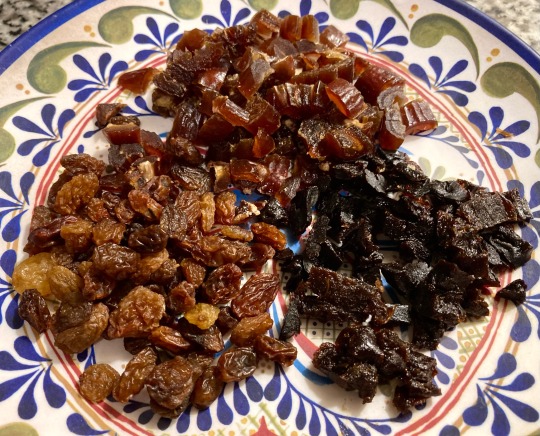
Instructions
1. Submerge wheat in water and scrub between your hands to clean and remove excess starch. Drain and cover by a couple inches with hot water. Cover and leave overnight.
2. Drain wheat and add to a large pot. Add water to cover and simmer for about 30 minutes until softened, stirring and adding more hot water as necessary.
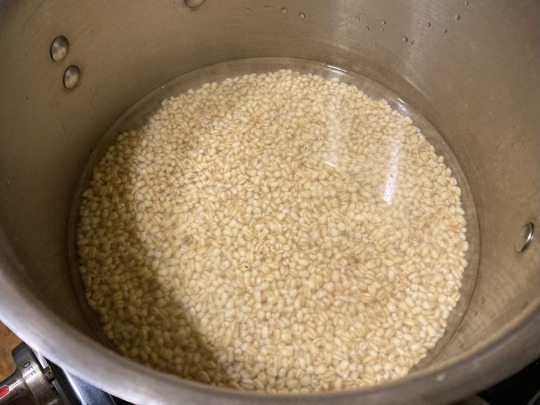
Wheat before cooking
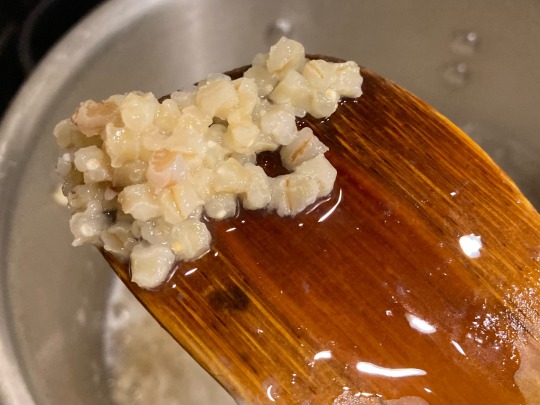
Wheat after cooking
3. Add dried fruit, sugar, salt, and spices and simmer for another 30 minutes, stirring occasionally, until wheat is very tender. Add water as necessary; the pudding should be relatively thin, but still able to coat the back of a spoon.
4. Remove from heat and stir in rosewater and honey. Ladle pudding into individual serving bowls and let cool in the refrigerator. Serve cold decorated with nuts and pomegranate seeds.
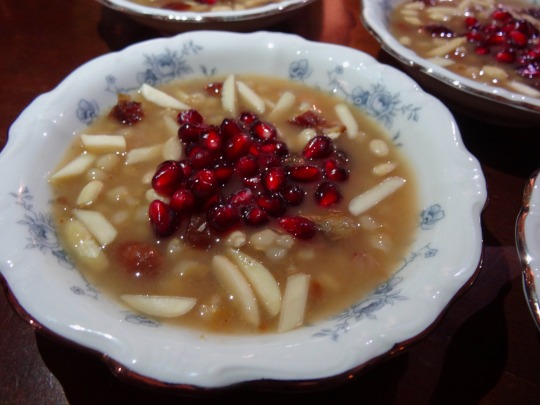
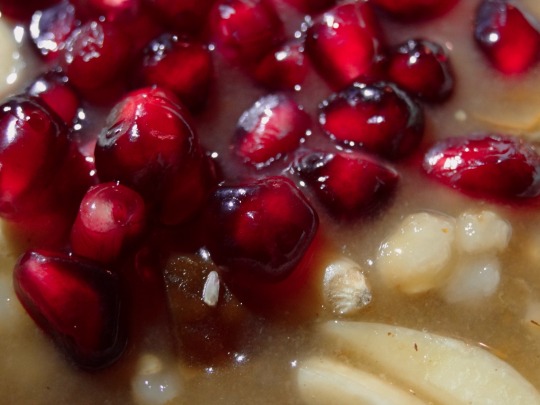
#the last link is a different / new fundraiser#Armenian#Palestinian#fusion#wheat berries#pearled wheats#pomegranate#prunes#dried apricot#dates#long post /
365 notes
·
View notes
Text
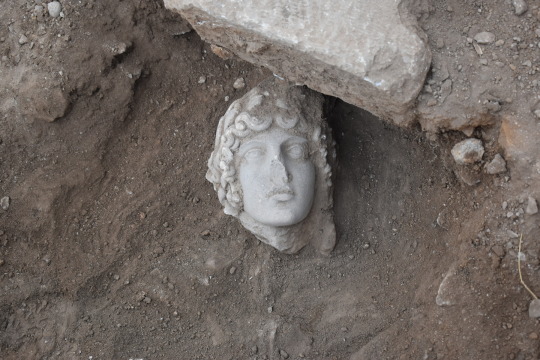
The Marble Head of Apollo Unearthed in Greece
The excavation, carried out by a group of students of the Aristotle University of Thessaloniki in the archaeological site of Philippi Kavala, brought to light important findings. Among other things, they discovered a rare head of Apollo dating back to the 2nd or early 3rd century AD.
The statue dates back to the 2nd or early 3rd century AD and it probably adorned an ancient fountain.
Natalia Poulos, Professor of Byzantine Archaeology, led the excavation, which included fifteen students from the Aristotle University of Thessaloniki (11 undergraduates, 2 master’s, and 2 PhD candidates), Assistant Docent Anastasios Tantsis, and Professor Emeritus of Byzantine Archaeology Aristotle Mendzo.
Archaeologists say, this year the excavation continued east of the southern main road (decumanus) at the point where it meets the northern axis of the city (the so-called “Egnatia”). The continuation of the marble-paved road was revealed, on the surface of which a coin (bronze phyllis) of the emperor Leo VI (886-912) was found, which helps to determine the duration of the road’s use. At the point where the two streets converge, a widening (square) seems to have been formed, dominated by a richly decorated building.
Archaeologists say evidence from last year’s excavations leads them to assume it was a fountain. The findings of this year’s research confirm this view and help them better understand its shape and function.
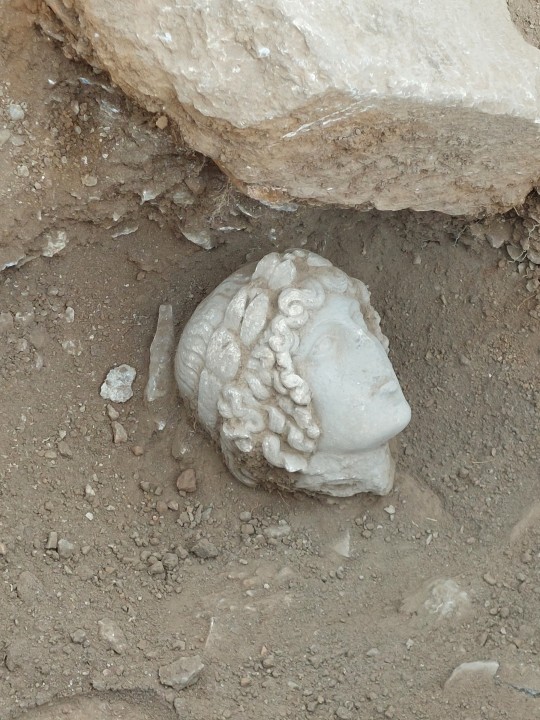
The research of 2022 brought to light part of the rich decoration of the fountain with the most impressive statue depicting Hercules as a boy with a young body.
The recent excavation (2023) revealed the head of another statue: it belongs to a figure of an ageneous man with a rich crown topped by a laurel leaf wreath. This beautiful head seems to belong to a statue of the god Apollo. Like the statue of Hercules, it dates from the 2nd or early 3rd century AD and probably adorned the fountain, which took its final form in the 8th to 9th centuries.
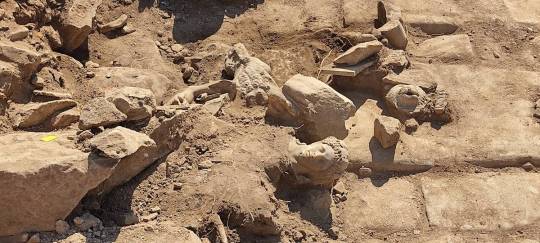
In classical Greek and Roman religion and mythology, Apollo is one of the Olympian gods. He is revered as a god of poetry, the Sun and light, healing and illness, music and dance, truth and prophecy, and archery, among other things.
Philip II, King of Macedon, founded the ancient city of Philippi in 356 BC on the site of the Thasian colony of Crenides near the Aegean Sea. The archaeological site was designated a UNESCO World Heritage Site in 2016 for its outstanding Roman architecture, urban layout as a smaller reflection of Rome itself, and significance in early Christianity.
By Oguz Buyukyildirim.
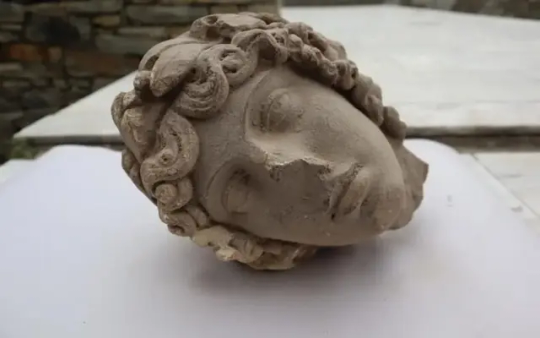
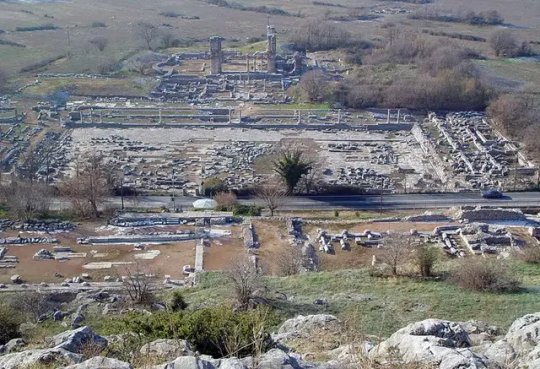
#The Marble Head of Apollo Unearthed in Greece#Philippi Kavala#marble#marble statue#ancient artifacts#archeology#archeolgst#history#history news#ancient history#ancient culture#ancient civilizations#ancient greece#greek history#greek art
200 notes
·
View notes
Text
Snapdragon - Bruce Wayne x Reader
Snapdragon (Antirrhinum) - Meaning: Presumption, deception
Summary: Reader thinks her boyfriend, Bruce Wayne, is cheating on her. Bruce tries to figure out how to tell her about his nighttime activities.
Pairing: Bruce Wayne x Reader
Word Count: 1864
Warnings: Suspected infidelity, angst, discussion of insecurities, a little bit of gaslighting/misdirection from Bruce, Alfred is a sassy bitch, Bruce is a mopey bastard, cliffhanger ending
Day 12 takes a sharp turn back into angst! I wrote this with the Christian Bale Batman and Michael Caine Alfred in mind, but use any Batman/Alfred you fancy. Also, sorry for the cliffhanger.
In Bloom Masterlist
Part 2: Snowdrop
Likes, Comments, and Reblogs are incredibly appreciated! ❤️

Bruce was cheating on you, you knew it. He hadn’t spent the night at your place in weeks, was texting you back at odd hours at night, and whenever you did manage to pin him down for a date he seemed disengaged, preoccupied, like he would rather be elsewhere.
Dating Gotham’s Prince was difficult enough as it was, press following you everywhere and your face showing up in supermarket tabloids — you were just a regular person, you didn’t come from money or rub elbows with Gotham’s social elite, you had a regular boring desk job to pay the bills.
You met Bruce by accident one day when you were on your way into work. You weren’t paying attention and almost walked into oncoming traffic, but Bruce had caught your arm just as you stepped off the curb, spilling your coffee. You’d turned, ready to give him such a tongue-lashing, but a motorcyclist zipped by at an ungodly speed right where you’d been about to step. Bruce then offered to replace your coffee and escort you to the office (“For your own safety,” he’d insisted with a devilish smirk that you couldn’t say no to).
You’d been dating ever since, almost a year now, which surprised most of the press. Numerous gossip sites were speculating about how you’d managed to keep Bruce’s interest for that long, but you’d learned to tune all their shit out.
The insecurity you felt now stemmed from Bruce’s own behavior, not the latest expulsion of bile from the gossipmongers online. You’d texted Bruce to meet you at your place after work, only receiving a thumbs-up emoji back.
You weren’t worth a real response. You weren’t worth his honesty. You weren’t worth him.
Shaking that insidious voice out of your head, you decided you needed a drink. In the middle of pouring yourself a glass of wine (box wine, another reminder of the insurmountable differences between you and Bruce) a knock sounded at the door.
Looking through the peep hole, you saw a large bouquet of flowers held in front of a tired-looking Bruce. You opened the door and let him in, accepting the flowers and a kiss on the cheek.
“Hello, gorgeous,” Bruce said, lingering near your cheek and stepping closer, putting his hands on your hips and pulling you closer to him. You tensed in his grasp, and he immediately let go, lifting your chin with a finger so you had to look him in the eye.
“You okay, sweetheart?”
Looking into his baby blues was a little too much to handle, so you simply nodded and moved away from him.
“Yeah, just gonna get these in water,” you said, lifting the bouquet slightly. Fishing the one vase you owned out of the cupboard, you filled it at the sink. Bruce followed your movements, hands in his pants pockets while he watched.
“I’ve only got a few minutes, unfortunately, but I was hoping you were free this Friday for a proper date,” he offered, smiling in his charming way. You only hummed your response, focusing on rearranging the flowers so they looked nice in the vase.
You had a speech prepared, known exactly what you wanted to say to him to get him to confess that he was cheating. Now that he was here, however, your well-formulated hypothesis was harder and harder to grasp. Like smoke, it dissipated the more you tried to catch it.
“You sure everything’s okay? You seem tense,” Bruce observed. That was your cue, and you knew you had to take it before he got any closer. Once he had his hands on you, every rational thought would flee and you’d be at his mercy.
“Are you cheating on me?” you asked, fighting to keep your composure. You’d never been good at confrontation, so you figured the best way to handle this was firm, direct, like ripping off a band-aid. You tried to put on a confident air even though your insides were practically liquifying with nerves.
Bruce sighed, “We talked about this, you can’t believe anything you read on those sites. They’re just in it for the clicks-”
“I’m not-! I didn’t get it off the internet, it’s just…you’ve been distant lately, and I can’t think of any explanation other than you found someone more…in your league,” you explained, wrapping your arms around you in an effort to comfort yourself. The insecurities you felt earlier were slipping into your words, despite your best efforts to shove them aside.
Bruce softened, took a step toward where you were standing in your kitchen. When you didn’t flinch away, he laid his hands on your shoulders. “Babe, you are in my league. Hell, you’re way above my league, and I don’t care what anyone else thinks.”
“I don’t either,” you said, “but this isn’t coming from an external source, it’s what I’ve noticed when it’s just the two of us. You seem distracted, like you don’t want to be in the moment with me. And it’s a rare occurrence that you text me back before midnight, if at all.”
Bruce’s hands stroked down your arms, warming your skin. He leaned down into your eye line. “I’m sorry for that. I didn’t know you were feeling that way, I’ll be better about being present with you, I promise. There’s just been a lot going on at work and it’s been…busy, I’ve been busy, you know?”
You nodded, “I know.”
“But,” he said, unhooking your hands from where they’d been holding your elbows, “Now that I know, we can fix it. I’m gonna do better. Thank you for telling me.”
You let him unfold your arms and bring them up around his shoulders, resting them there and bringing his hands to your lower back. He kept his grasp loose until, against your better judgment, you tightened your arms and pulled him into a hug. He returned your embrace, planting a gentle kiss to your forehead.
When he held you like this it was easy, too easy, to forget your stupid insecurities and let yourself trust him. In his embrace, every imperfection you nitpicked about yourself ceased to exist. He was a safe space — well, until recently.
Bruce said your name quietly to get your attention. You looked up at him.
“I love you,” he said, the look on his face betraying the heartbreaking truth of his statement.
You pushed up on your toes and kissed his lips quickly — any slower and you’d completely melt into him.
“I love you too, Bruce.”
________
Later that night…
Bruce was well and truly fucked. He’d known it was only a matter of time before you noticed his odd behavior, the late hours, the preoccupation and distractibility. Fuck!
He and Alfred had rules, dammit, and he should’ve followed them.
No more than five dates or two months, whichever comes first.
They’re never allowed to roam the house unsupervised.
Most importantly, keep feelings out of it. Sex and companionship, nothing more and nothing less.
But it was different with you. You’d…surprised him, which he didn’t think was possible anymore. You were funny and gorgeous — not his usual type, but still enchanting — and a little spiky, which only intrigued him more. For the first time, Bruce wanted to get to know someone on a deeper level. Maybe it was age, or he was finally ready to admit he wasn’t an island, or maybe he was just sick of the endless line of vapid, waifish model-types he usually dated, but whatever the reason you came into his life at exactly the right time and you were…perfect.
What was the old saying, nothing good can stay? The truth of that statement weighed on him as he pulled off the suit, tossing the pieces haphazardly all over the cave, leaving a trail to where he eventually settled in his computer chair.
“Y’know, sir, while kevlar is good at stopping bullets it does rather badly when left unattended on a damp cave floor,” Alfred scolded gently, bending to pick up the pieces of Batman. Bruce only grunted at his butler, pulling up the dossier he’d been preparing on the Joker. The last few weeks it looked like the psychopath had reemerged, which is why he’d been so preoccupied. Gotham barely survived the last scrape with that psychopath, so Batman had been doggedly hunting him after the sun went down.
“Did you stop by her place, then?” Alfred asked, referring to you. “She seemed rather insistent on it.”
Bruce paused, then sighed and turned to face Alfred. “She thinks I’m cheating on her.”
“Not exactly an incorrect assumption,” Alfred joked. Bruce flashed him a glare, but the butler didn’t notice. “Well, we knew this was coming didn’t we? Once you started breaking the rules for her, it was only a matter of time.”
Bruce internally groaned, not wanting to admit Alfred was right. “I just wish I knew what to do. She’s the first person in a long time that I’ve actually wanted to have around. Present company excluded, of course.”
“Of course, sir,” Alfred said. “You’ve arrived at a crossroads, if you don’t mind me saying. You either tell her, or you don’t.”
“How do I know if I should tell her?”
“That answer lies in how much you trust her to keep your secret.”
“And how do I know that I won’t lose her even if I tell her?” Bruce asked, voicing his biggest fear. Painting a target on your back as well as his, and then being shoved out of your life.
Alfred laid a comforting hand on Bruce’s shoulder, like he always did when sharing a hard life lesson. “You don’t, Master Wayne.”
The hand left his shoulder and Bruce turned back around, each man now going about their usual business. A few quick incident reports later Bruce made his way upstairs to his bedroom, hoping with how tired his body was that sleep would claim him quickly.
No such luck.
Instead, he tossed and turned, going over every possible outcome of the inevitable conversation.
Option 1: He tells you about Batman, you accept it, and the two of you make it work. This, of course, was the ideal scenario so he knew that wouldn’t be the outcome. Nothing in his life worked out ideally.
Option 2: He tells you about Batman, you freak out and break up with him, and you become a huge liability. Giving you that knowledge would be like handing you a grenade with the pin pulled out — if you held onto it, you were both safe, but if you let go…Kaboom. And how long could you hold onto a secret that big, that dangerous?
The last option was that he doesn’t tell you, you continue to assume he’s cheating on you, and you break up with him eventually. He loses you, but you remain unaware and therefore safe — from his enemies, from prosecution, from whatever else came from being Batman's girlfriend.
Around three in the morning Bruce’s mind was made up, his next steps planned, and resolve steely, but he waited until half-past five (a more normal wake-up time) to text you.
‘Dinner at my place tonight. We need to talk.’
Read Part 2 Here
#writing challenge#fanfiction#in bloom#angst angst baby#angst#bruce wayne x reader#bruce wayne x you#bruce wayne fic#batman x reader#batman x you#alfred pennyworth#batman fic#batman fanfic
207 notes
·
View notes
Text
Important PSA
Criticizing Israel is NOT antisemetism or an attack on Jewish people because
ISRAEL =/= ALL JEWS
And while I am not saying that there is no antisemitism because there is plenty of that too, this is not a case of that. But grouping all Jews together as Israeli and presenting them as a monolith erases their individuality and identity. It's like calling all Asian people Chinese, and that if you criticize China, then you hate all Asian people. It doesn't make sense.
I am so frustrated seeing people who are trying to raise awareness about Palestine be called antisemetic and disgusting by people who cannot perceive Jews and Muslims as anything but a monolith. That's the reason why so many people are having trouble distinguishing between Hamas and Palestinian civilians, because to them, they're all the same.
And that's why they don't see an issue with collective punishment.
And you know what? Palestine is NOT just the Jewish holy land. It is also the Christian holy land, and the Muslim holy land. Palestine wasn't even the first choice for a Jewish homeland because it was heavily contested by Jewish rabbis at the time.
Turning Palestine (I say Palestine because the entirety of what is now Israel used to be Palestine) as an exclusively Jewish ethno-state means that people of Christian and Muslim faith all over the world are stripped of their holy land. The oldest church in the world, dating back to the times of Christ is located in Gaza, and who are the ones protecting it? Palestinians.
And you know who bombed it? Even though it had 500 refugees of both Muslim and Christian faith inside? Israel.
Even the slogan used for the founding of Israel itself, "A land without people for a people without a land." Is blatantly revisionist and erases the existence of Palestinians already living there. It erases all the historic religious sites that stand there and are frequented regularly by their respective devotees. Or worse, does not consider the Palestinians as 'people.'
Some people tend to forget that religious belief is NOT the same as race, and so you CANNOT claim indigeneity just because you are a certain religion. I am an Indonesian Muslim. Born Muslim, raised Muslim, and every generation of my family have been Muslim. That doesn't mean I can say I'm indigenous to Saudi Arabia. Let alone that Saudi Arabian land is my birthright.
If a white American woman born and raised in Seattle decides to convert to Hinduism, can she then say she is now indigenous to India? Or if she has a child, and that child had a child, and they were all raised as a Hindu, but have always lived in the US all their lives, can they claim that they are indigenous to India?
No.
And the fact is, the first Jewish settlers during The First Aliyah (great Jewish migration to Palestine) came from Eastern Europe and are genetically closer to Russians and other Slavs than they are to the Jews who remained in the Middle Eastern region after their exile (and I guess some people forget that you can convert into Judaism even if you didn't come from "The Promised Land." Like for marriages and stuff.) That's why they feel the need to distinguish themselves from the word "Arab."
Granted, there were also Yemeni Jews that migrated with them (whom I would say have stronger claims to indigeneity), but even in the transition camps, there was a clear divide between the European Ashkenazi Jews and the Yemeni Jews, who literally had their kids taken from them to give to the Ashkenazi Jews.
And let's not forget that when Jewish migrants from Ethiopia came, they were given contraceptives without consent to make sure they didn't impact the "desired" population.
Wake up. This isn't a religious war. This is European colonization.
341 notes
·
View notes
Text
youtube
Watch the American Climate Leadership Awards 2024 now: https://youtu.be/bWiW4Rp8vF0?feature=shared
The American Climate Leadership Awards 2024 broadcast recording is now available on ecoAmerica's YouTube channel for viewers to be inspired by active climate leaders. Watch to find out which finalist received the $50,000 grand prize! Hosted by Vanessa Hauc and featuring Bill McKibben and Katharine Hayhoe!
#ACLA24#ACLA24Leaders#youtube#youtube video#climate leaders#climate solutions#climate action#climate and environment#climate#climate change#climate and health#climate blog#climate justice#climate news#weather and climate#environmental news#environment#environmental awareness#environment and health#environmental#environmental issues#environmental justice#environment protection#environmental health#Youtube
16K notes
·
View notes
Note
Hello, I really don’t want to be rude or anything like that but I would love to know any more information about the Christians in Palestine, Lebanon and Syria like, is it true Gaza had family lineages dating back to Jesus Christ? Asking because Ziocucks love making it seem as if Christians don’t exist over there
omg not rude at all, actually this is my favorite thing to talk about (it was a major focus of this blog prior to Al-Aqsa Flood)
it's a huge topic so I'll link a ton of resources, but to answer your main question: yes, many Palestinian Christians in Gaza and elsewhere can trace their family history with Christianity back to the 1st century. the Christian community in Gaza is said to have been founded by the apostle Philip. the first bishop of Gaza was the apostle Philemon, the recipient of a Pauline epistle.
a core zionist myth is the idea that contemporary Palestinians only arrived in Palestine in the 7th century or even the 20th century (see the links for debunking). but there's plenty of documentation of continuous Christian (and Jewish) presence in Palestine before, during, and after the emergence of Islam. Palestinians (and Levantine ppl more generally, but esp Palestinians because of the totality of their colonial dispossession—stories are often literally the only heirlooms refugee families have) typically have very strong family oral histories going back many centuries, so if a Palestinian tells you their family has been Christian since the time of Christ, take their word for it. community continuity is also about more than family trees—even if someone's family came to Christianity later, they're still part of the continuous living heritage of their community.
the continuity of Palestinian Christianity is also evidenced by Palestinian holy sites. because Christianity was illegal in the Roman Empire until Constantine took power, dedicated churches weren't built until the 4th century, but many of these churches were built around existing sites of covert worship—for example the Church of the Nativity in Bethlehem was built around a grotto that was already venerated as the site of Jesus' birth, the Church of St. John the Baptist in 'Ayn Karim (a forcibly depopulated suburb of Jerusalem) was built over a 1st century rock-cut shrine marking the site of John the Baptist's birth, and the Church of the Multiplication in Al-Tabigha (a destroyed and forcibly depopulated village on the shore of Lake Tiberias) was built over a limestone slab believed to be the table were Jesus fed the multitude. throughout the Levant there are also many ancient shrines (maqamat) that are shared sites of prayer for both Christians and Muslims; in Palestine many of these sites have been seized by the occupation and Palestinians are prevented from visiting them.
Palestinian Christian communities who are able to travel to the villages they were expelled from in the Nakba will sometimes return there to celebrate weddings and holidays in their ancestral churches, e.g. in Iqrit and Ma'alul (x, x). of course because the occupation heavily restricts Palestinian movement this isn't possible for most refugees.
here's some resources to get you started but feel free to hmu again if you have any more specific questions!
Zionism and Palestinian Christians
Rafiq Khoury, "The Effects of Christian Zionism on Palestinian Christians," in Challenging Christian Zionism (2005)
Mitri Raheb, I am a Palestinian Christian (1995)
Mitri Raheb, Faith in the Face of Empire: The Bible Through Palestinian Eyes (2014)
Christ at the Checkpoint: Theology in the Service of Justice and Peace (2012)
Faith and the Intifada: Palestinian Christian Voices (1992)
The Forgotten Faithful: A Window into the Life and Witness of Christians in the Holy Land (2007)
Faith Under Occupation: The Plight of Indigenous Christians in the Holy Land (2012)
Palestinian Christians: The Forcible Displacement and Dispossession Continues (2023)
Donald E. Wagner, Dying in the Land of Promise: Palestine and Palestinian Christianity from Pentecost to 2000 (2003)—can't find it online but worth checking your library for
Pre-Zionist History
James Grehan, Twilight of the Saints: Everyday Religion in Ottoman Syria and Palestine (2016)
Ussama Makdisi, Artillery of Heaven: American Missionaries and the Failed Conversion of the Middle East (2008)
Kenneth Cragg, The Arab Christian: A History in the Middle East (1992)
Christopher MacEvitt, The Crusades and the Christian World of the East: Rough Tolerance (2007)
John Binns, Ascetics and Ambassadors of Christ: The Monasteries of Palestine 314-631 (1996)
Derwas Chitty, The Desert a City: an Introduction to the Study of Egyptian and Palestinian Monasticism Under the Christian Empire (1966)
Aziz Suryal Atiya, A History of Eastern Christianity (1968)
Michael Philip Penn, When Christians First Met Muslims: A Sourcebook of the Earliest Syriac Writings on Islam (2015)
Early Christian Texts
The Acts of the Apostles (1st century, Palestine. yes I'm recommending the bible lol but I promise I'm not trying to evangelize, it just really paints a good picture of the birth of Christianity in Jerusalem and its early spread)
The Didache (1st or 2nd century, Palestine or Syria—the earliest known catechism, outlining how Christians were supposed to live and worship)
Cyril of Scythopolis, The Lives of the Monks of Palestine (6th century)
Sayings of the Desert Fathers and Desert Mothers (early Christian monastics)
for more resources specific to my tradition, the Maronite Church, see this post. for other misc Syriac tidbits see my Syriac tag. this is just scratching the surface so again, if you (or anyone else who sees this post!) have more specific interests lmk and I can point you in the right direction
134 notes
·
View notes
Text
Looking for The Best Dating Site | Christian Dating Sites
Pursue Dating is the fastest-growing online Christian Dating Site. We use math to get you dates.
It’s extremely accurate, as long as (a) you’re honest, and (b) you know what you want. We are completely free.
Most other matching sites are just glorified personals services. Their “matching” systems are nonexistent or overly subjective. We don’t claim to evaluate you perfectly, but we do claim to find someone who claims to fulfill your claimed requirements, exactly.
so if you looking for The Best Dating Site then visit us
0 notes
Text
Byzantine shipwreck
Last year, two amateur divers found a piece of wood sticking out of the sand off the coast of Israel. A little later it turned out to be a Byzantine shipwreck from the 7th or 8th century AD.
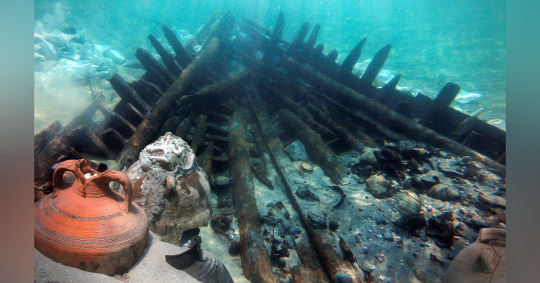
This merchant ship, made of fir and walnut wood, was loaded with treasures from all over the Mediterranean. The wreck contained more than 200 amphorae with the remains of fish sauces, olives, dates and figs. What led to its sinking more than 1,200 years ago is unknown.
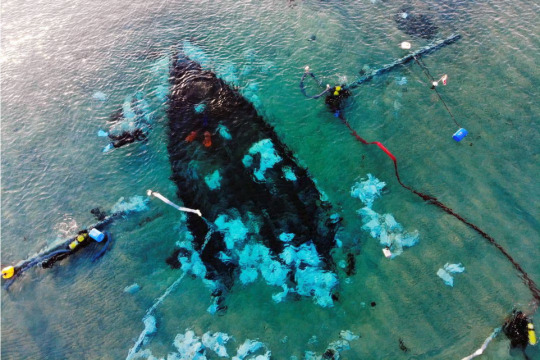
The once 25-metre-long vessel at the Ma'agan Mikhael B site lies at a depth of only about three metres. Further research and recovery of the artefacts continues to this day, but it is possible to identify food vessels of different origins and languages. This means that the ship sailed from port to port during a time of great religious unrest. At that time, the Christian Byzantine Empire was losing its hold on the eastern Mediterranean and Islamic rule was spreading. The shipwreck off Ma'agan Michael is evidence that trade with the rest of the Mediterranean continued despite the religious schism, contrary to what scholars have assumed.
320 notes
·
View notes
Text
you know how there's a dating site called "Plenty of Fish"?
If you wanted to make a dating site along similar lines, but specifically aimed at gay christian men, you could call it "Fishers of Men"
104 notes
·
View notes
Text
youtube
Watch the 2024 American Climate Leadership Awards for High School Students now: https://youtu.be/5C-bb9PoRLc
The recording is now available on ecoAmerica's YouTube channel for viewers to be inspired by student climate leaders! Join Aishah-Nyeta Brown & Jerome Foster II and be inspired by student climate leaders as we recognize the High School Student finalists. Watch now to find out which student received the $25,000 grand prize and top recognition!
#ACLA24#ACLA24HighSchoolStudents#youtube#youtube video#climate leaders#climate solutions#climate action#climate and environment#climate#climate change#climate and health#climate blog#climate justice#climate news#weather and climate#environmental news#environment#environmental awareness#environment and health#environmental#environmental issues#environmental education#environmental justice#environmental protection#environmental health#high school students#high school#youth#youth of america#school
16K notes
·
View notes